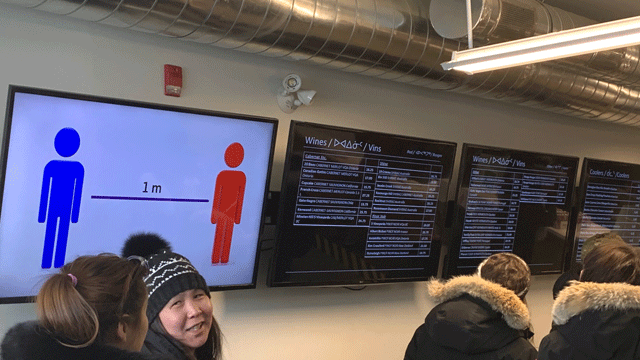
You only need to visit the Iqaluit Beer and Wine Store to see Nunavummiut embracing the new reality of social distancing.
The small outlet – the only of it’s kind in Nunavut – has placed tape on the floor marking one-metre intervals, so that people can properly space themselves while waiting in the notoriously packed line.
One of the digital menus no longer lists available wines; it reminds you not to get too close to your neighbour.
Iqaluit’s taxis are the de facto public transport for the Nunavut capital. Traditionally, cabbies could pick up another fare while there was still someone else in the cab, because it is a set $8 fee to anywhere in the city.
Iqaluit’s Caribou Cabs announced today that they are no longer making multiple pick-ups on one trip to limit close contact with others.
This is what Nunavut Premier Joe Savikataaq is hoping for: for Nunavummiut to slow the spread of the pandemic so that Nunavut’s limited healthcare services can keep up with the rate of infection.
On March 11, the World Health Organization (WHO) declared COVID-19 a pandemic.
On March 11, the World Health Oganization declared the COVID-19 outbreak a pandemic. APTN News is reporting from across the country on the viral outbreak and how it is impacting Indigenous communities. For more information click here: COVID-19
Nunavut still does not have a case of COVID-19 as of publishing time. But questions from the public are on the rise. That’s why Premier Savikataaq and Chief Public Health Officer Dr. Michael Patterson are now holding briefings daily.
In his remarks, Savikataaq mentioned the possibility of economic support for Nunavummiut impacted by the virus, but he wouldn’t go into specifics.
“Its at the very beginning of it, so I can’t comment much more on it, but we are working on it,” said Savikataaq. “We are looking at it as a federal ask, and as one of our own. It’s at the very early stages.”
Nunavut has notoriously crowded housing. According to the Nunavut Housing Corporation, it would take $2-billion in immediate spending to build enough homes just to break even. Iqaluit’s men’s shelter alone houses more than 50 homeless people nightly in a four-bedroom house.
How does Nunavut begin to slow COVID-19 when all the factors to let it thrive are available in the territory?
“You wash your hands and do your best to social distance, and try not to share any objects,” said Premier Savikataaq. He added, “That’s the best we can do. Its not an ideal situation, obviously.”
One near constant question from Nunavut residents is “why not just test everyone and then we’ll know who to isolate?”
According to Dr. Patterson, that is bad science and could pose even more risk.
“If you were exposed on Thursday and swabbed on Saturday, the test will probably come back negative,” explained Patterson. “Four days later when the symptoms appear, people tend to think they don’t have to worry about COVID, and then will spend several days out of isolation, spreading the infection.”
Nunavut’s Baffin Correctional Centre – Iqaluit’s catch all jail and remand centre – was called one of the worst prisons in Canada by the federal auditor general in 2015.
It is over crowded and aging and currently being renovated.
If COVID-19 hit that jail, it would have a captive audience.
“I’ve met with them,” said Dr. Patterson. “We’ve met with them about cleaning and contingency plans should COVID-19 get into a correctional facility.”
Dr. Patterson let the assembled reporters know that the number of outstanding tests is not going to be updated daily anymore, rather every other day to reduce workload on Health Department staff.
Yesterday, they were still waiting for 30 results.
“We’ve been testing all over the territory. I can’t tell you exactly which communities, but I’ve received calls from staff in all three regions of Nunavut,” said Patterson.
Canadian North announced today that they are reducing their flight schedule. There is now only one flight per day to and from Ottawa, and flights to communities are now every other day. The Nunavik Inuit region of Northern Quebec has announced that they no longer want visitors. So have at least four Nunavut communities. The possibility for a more formal stay-away warning exists.
“Its a possibility, and we’ve already asked that all non-essential travel cease. Some of those restrictions come down to federal jurisdiction, to make it more firm than we can do. Right now, it is a recommendation and a request, that all non-essential travel be avoided.”
Iqaluit is the regional health hub for Baffin Island, and steps are being taken at Qikiqtani General Hospital to slow the spread of the virus.
“Visitors are being asked to wear masks. It goes to the social responsibility. If we want to protect ourselves, we have to protect each other,” said Dr. Patterson.
There is no vaccine yet for COVID-19, and at least one example of someone catching it twice. Once it takes hold in Nunavut, the territory could be fighting a running battle for an undetermined amount of time.
“There is one report of someone catching it twice, but that is one person out of 150,000 some cases around the world right now. Many people do develop immunity to it. Vaccines are being worked on, so there’s a possible number of avenues for elimination,” said Dr. Patterson, adding, “The honest answer right now is that it is an interesting thought and an interesting question, but we’ve got other stuff to do right now.”









